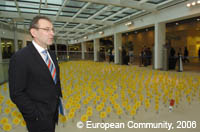EURATOM Treaty key to future nuclear safety, says Piebalgs
EU Energy Commissioner Andris Piebalgs addressed a plenary session of the European Parliament on 26 April, speaking of the effects and lessons of the Chernobyl disaster 20 years on. Mr Piebalgs opened by revealing that he was in present day Ukraine at the time of the accident, and his brother-in-law had been drafted as a 'liquidator' to help in the clean-up operation. Liquidators often suffered huge doses of radiation as a result of this very dangerous work. While all efforts have been focused on minimising the chances of a repeat Chernobyl, the Commissioner outlined how research had identified key priorities, in order to be prepared should another accident occur. 'At European level, I would recall firstly that the EURATOM Treaty Chapter on Health and Safety provides both for the protection of the health of workers, and for that of the general public against the dangers arising from radiation. The Treaty also obliges Member States and operators to supply the Commission with regular information on installations and nuclear material in their possession,' said the Commissioner. The EURATOM Treaty is one of the founding pillars of the EU. European nuclear research is still carried out under the EURATOM tag today, and EURATOM now falls under the Commission's framework programmes for research, now into their sixth period (FP6). Additional legislation is in place to address the consequences of potential accidents - many areas in Europe continue to suffer from high levels of radiation thanks to the disaster. This has particularly affected agriculture. 'Soon after the accident, restrictions on certain agricultural imports were adopted and some border controls still apply today. If ever needed, a Community mechanism will allow fixing promptly the maximum permitted levels of contamination of foodstuffs and feedingstuffs,' he said. In emergency planning, centres should make detailed plans on both a regional and a national level, and there should be cooperation from other Member States. Should an emergency occur, 'A Community system is in place for the early exchange of information in the event of a radiological emergency ('ECURIE'). All Member States, Switzerland, Bulgaria, Romania and Turkey participate in this mechanism,' he said. Territories now also have advance warning systems. Despite denials in the then Soviet Union, Scandinavian countries and Germany had already deduced that a 'maximum credible accident' had occurred before information on Chernobyl had been released or even admitted. This network of detection has now spread to all Member States. The protection of citizens remains at a premium. 'Information for the population covers advance information to people living close to nuclear installations as well as protection mechanisms to be provided to the population actually affected by such an emergency,' he said. The Commissioner went on to describe how reactors across Member States and candidate countries have been upgraded or even closed due to potential safety issues. He also thanked the Parliament for including nuclear safety in the 15 March 2006 resolution on the Lisbon Strategy. This recognises that the EU is a world leader in 'efficiency and quality of production installations, and decommissioning processes'. 'Finally, the Parliament is aware that the Commission has made specific legislative proposals intended to provide the Union with common rules on nuclear safety, safe management of spent fuel and radioactive waste, decommissioning funds. Furthermore, the Commission will make every effort in the area of research and development to help to find a sustainable solution to the issue of the radioactive waste. Once again, I wish to thank the Parliament for its support,' concluded the Commissioner.

